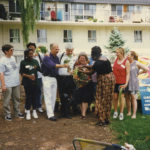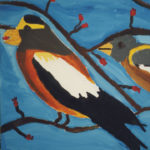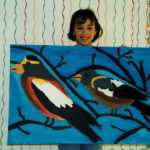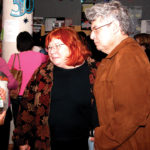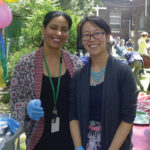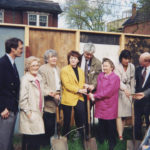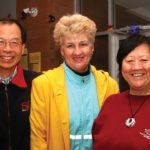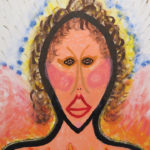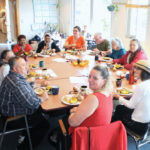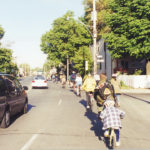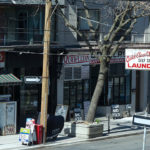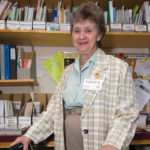TWO GENERATIONS! FORTY YEARS!
Forty-one years ago this Community Health Centre was just a vision. Forty years ago it became a reality. And those pioneers and advocates who fought to get the lead out of the soil are the same community members who founded this Centre. We have indeed evolved from modest beginnings on Pape Avenue to 955 Queen Street East, 20 years later. And now, after two generations and 40 years, we have continued to build on the broad shoulders of our founders, whose wisdom we hold dear and whose values continue to exist in everything we do. Our walls echo with their inspiration as they continue to caution us with sage guidance to never lose our vision or compromise our passion as we work to create a healthier, connected community where everyone belongs. And, testimony to them, we have made a great start. As we welcome the next 40 years with new neighbours, new members, and new challenges, we will remember their stories and create our own, as we continue to deepen our work and hold fast to our vision.
So please join us in our renewed and relentless commitment to building a healthier neighbourhood, community, city, and country, honouring the memory and wisdom of our founders, whose values of social justice and equity for which this Centre and this community have become renowned.
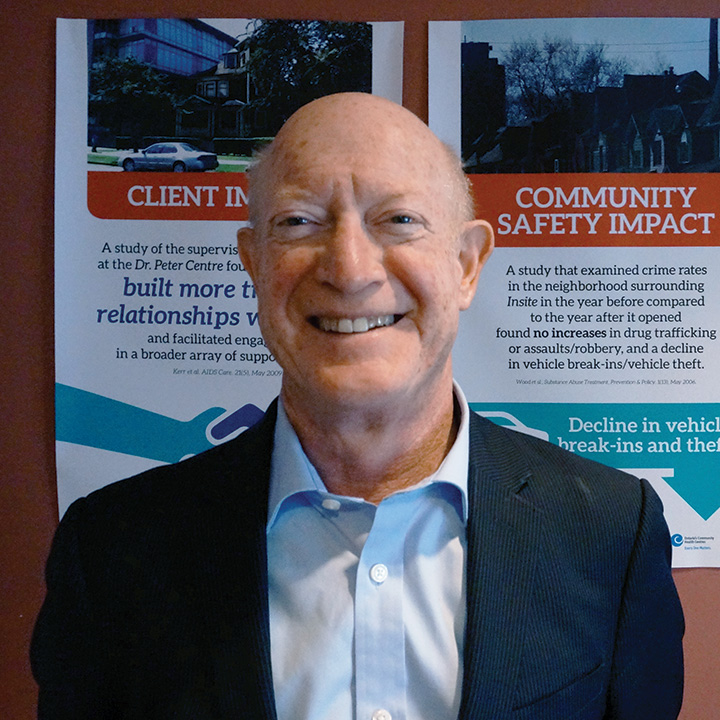
DR. MICHAEL RACHLIS
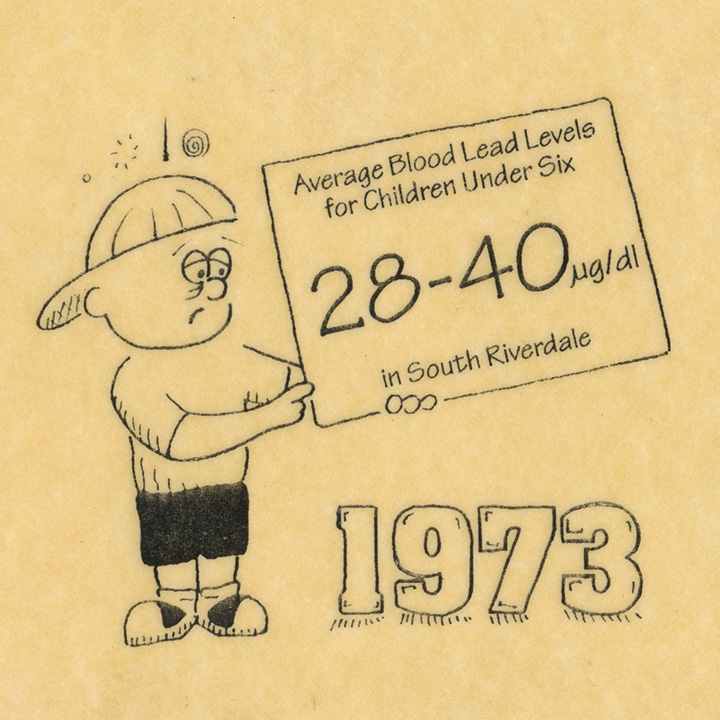
PUTTING A FACE ON ENVIRONMENTAL HEALTH
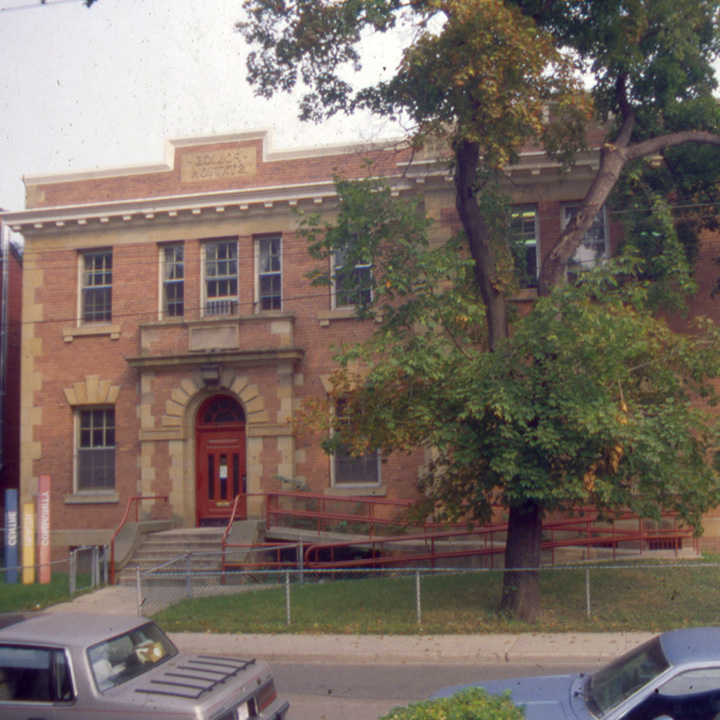
276 PAPE AVENUE
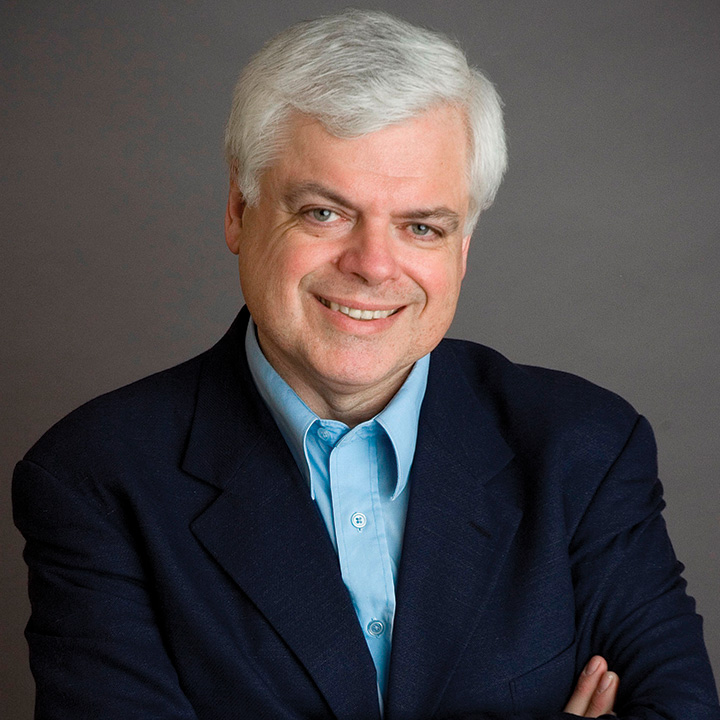
PETER TABUNS

BIRD PORTRAITS

CAROL KUSHNER

FRANK CRICHLOW

LISA KHA
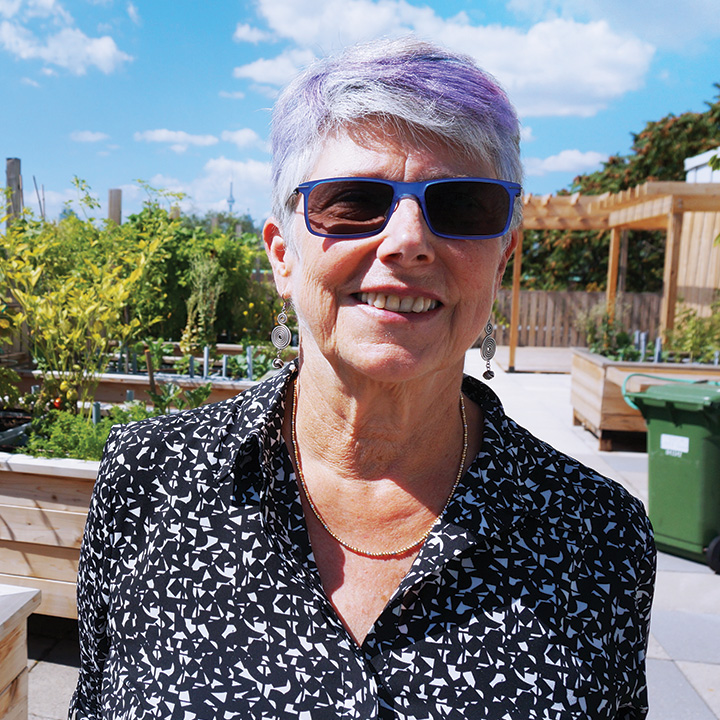
MAGGI REDMONDS

LIZ FELTES
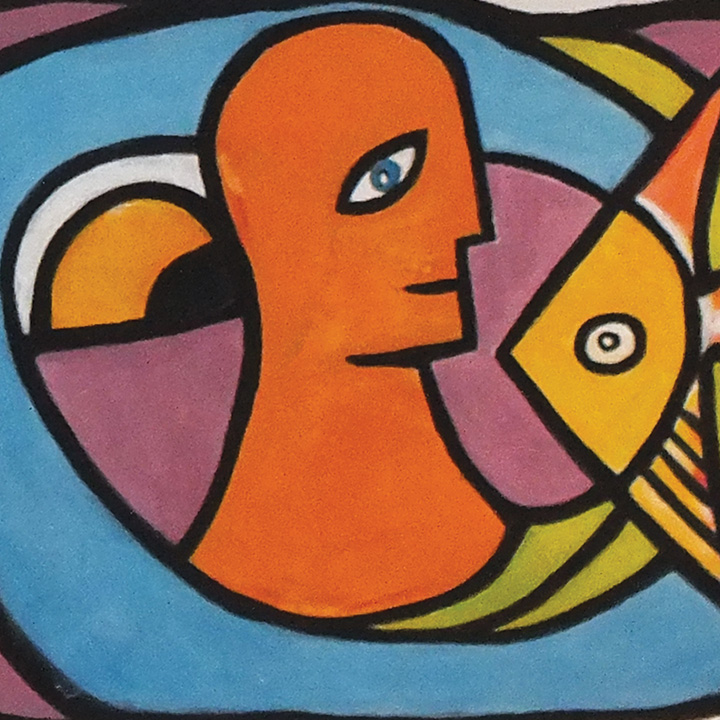
BREATHLINES

RUTH GIBSON
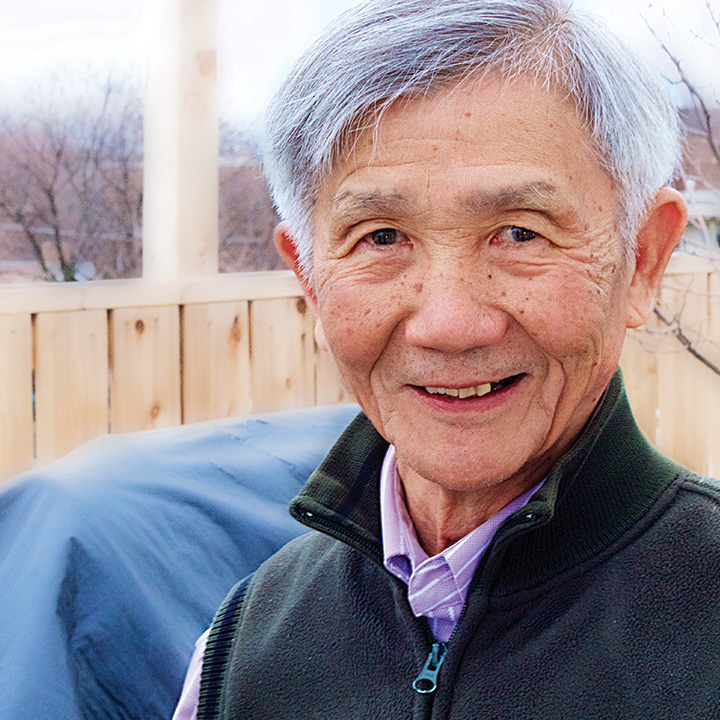
WAN CHIN CHEONG

DR. PHILIP BERGER
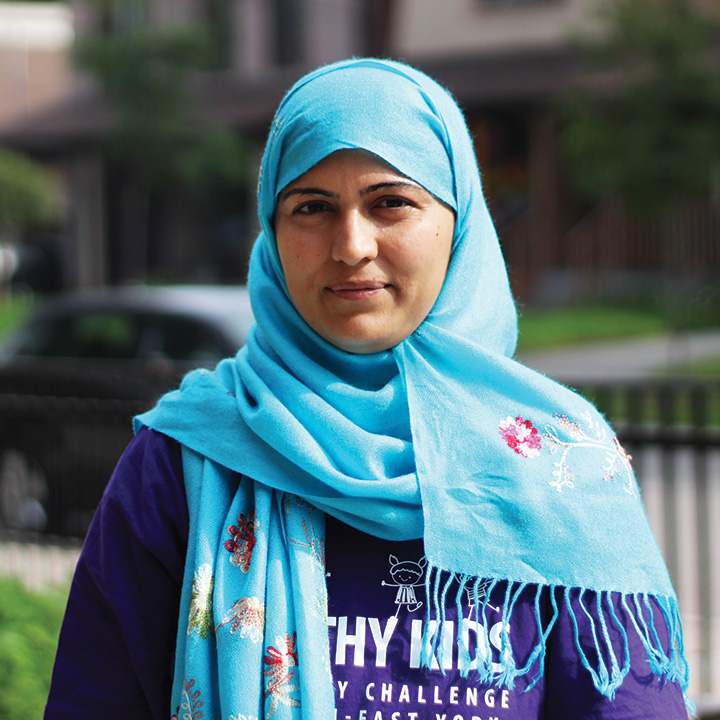
Zoobia Safdar

PAULA FLETCHER
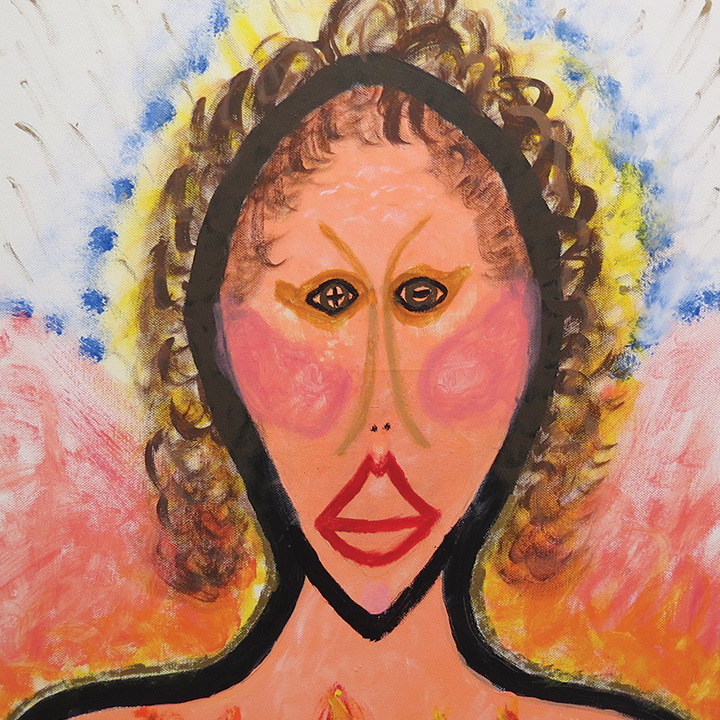
PAINT ME

MERILLE SPENCE

JACOB ALLDERDICE

CATHY CROWE
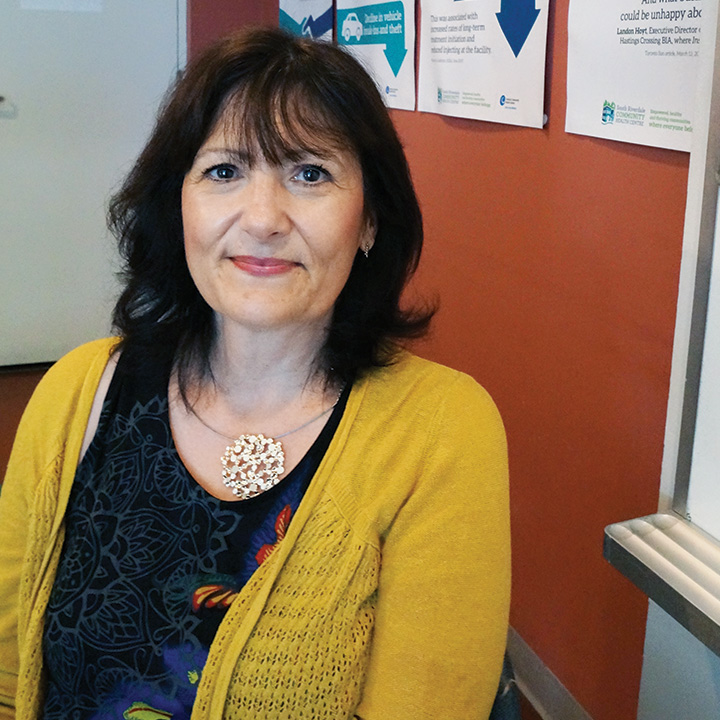
JORIE MORROW

FACING OFF AGAINST RACISM

SALHA AL-SHUWEHDY

ANDREW SHERBIN
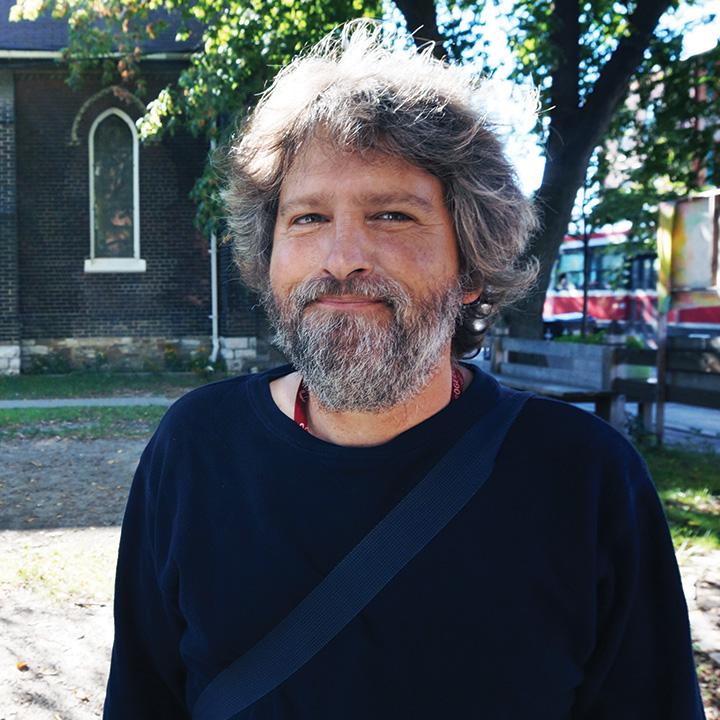
MICHAEL HOLLOWAY

TARA

MICHÈLE HARDING

JIM RENWICK (1917–1984)
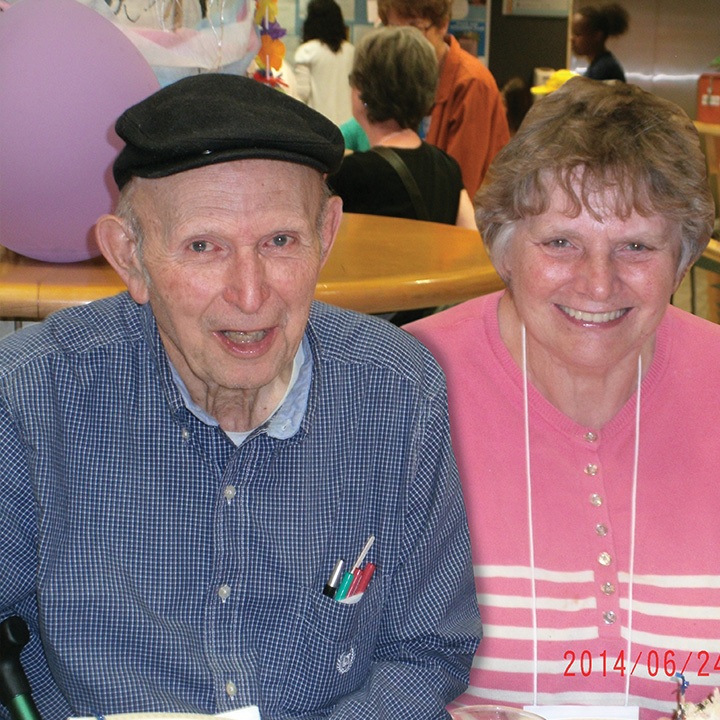
SHEILA AND GEORGE CRAM

JULIE DABRUSIN

RESPECT PROJECT
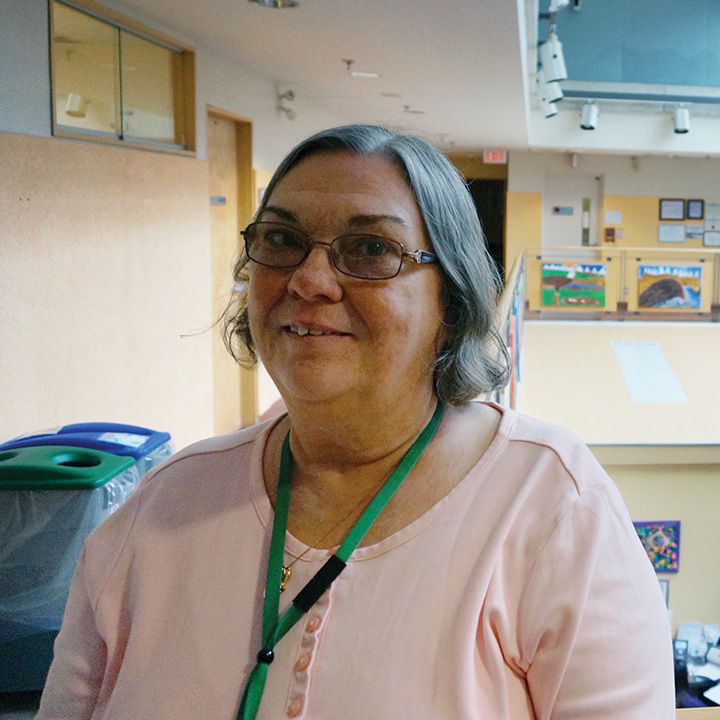
MARIANNE CHEETHAM

CHRIS GORT
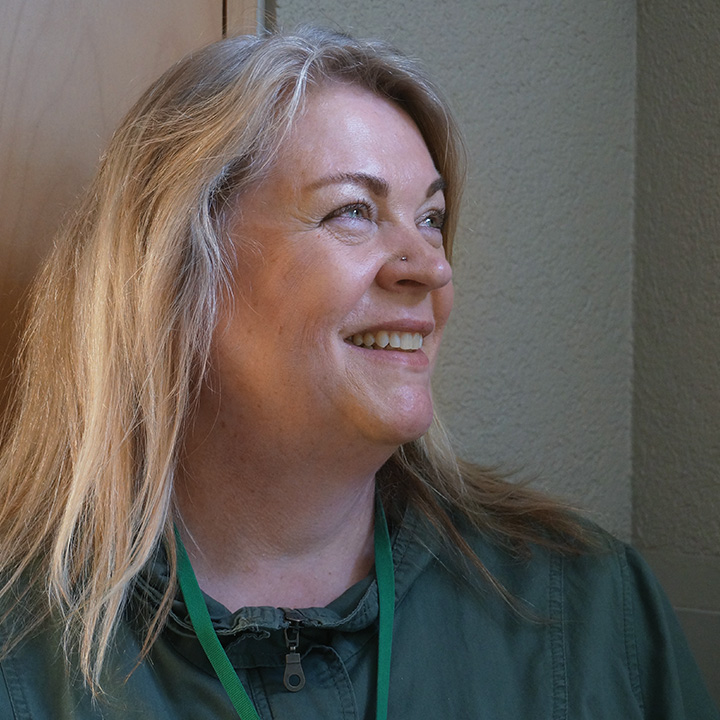
DEBBY YUKE
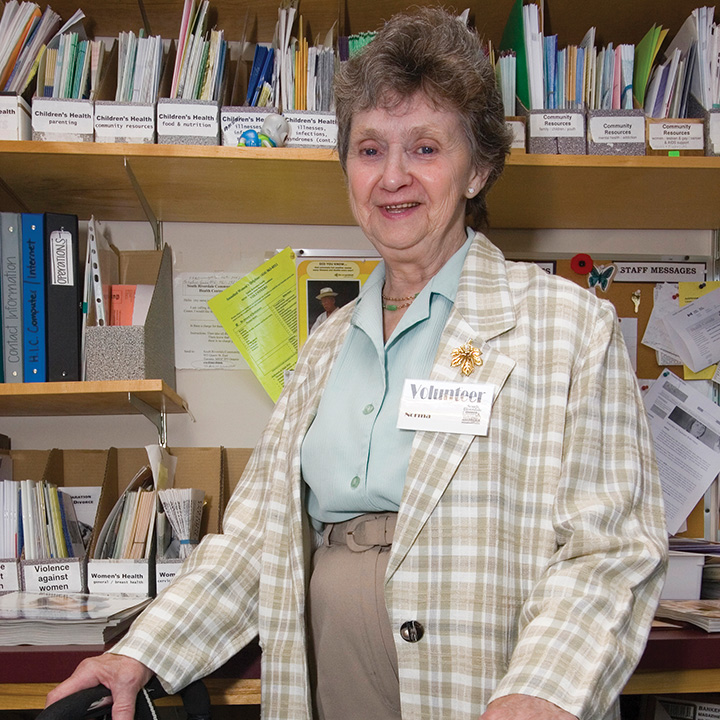
NORMA AND AL LEVITT

FACE TO FACE WITH NEW TECHNOLOGY

FACES OF THOSE WE LOST
-

DR. MICHAEL RACHLIS
Dr. Michael Rachlis is an Adjunct Professor at the University Toronto Dalla Lana School of Public Health, and has worked as a consultant, advising governments on health care policy issues, for nearly 30 years. Dr. Rachlis practised at the South Riverdale Community Health Centre for eight years, from 1976 to 1984. He is also a frequent media commentator on health policy issues and the author of three bestselling books about Canada’s health care system.
You have been involved with the Centre right from the beginning. How did it all start?
In 1969, four local clergy hired a Chicago-trained community organizer to work with the people of South Riverdale. Over the next few years, a number of groups organized themselves around a variety of issues. One group was concerned about the lack of health care services and became incorporated as the South Riverdale Community Health Centre. Ontario had adopted Medicare in 1971, which meant that now all residents had health insurance, but by 1975 there were still only two family doctors to serve over 30,000 South Riverdale residents. The Ontario Ministry of Health had begun funding Community Health Centres in 1973 and the Centre’s Board received a promise of funding in early 1975. However, prodded by opposition from the Ontario Medical Association, the ministry froze the Community Health Centre program shortly after this Centre’s funding was announced. The community rallied and with the assistance of some local politicians, the ministry relented. This Centre was the last one to be funded for many years.
I graduated from the University of Manitoba medical school in 1975 and completed my internship in Hamilton in 1976. In June 1976, I moved into a house on Hamilton Street near Broadview and Queen, and began my job search. I was delighted to hear that the Centre was about to open, and I applied for a job in July 1976. It was exactly the right place for me. I wanted to work in a Community Health Centre in a community like South Riverdale. The Board and the community wanted better health care and better health. And they were prepared to change policy across the province and across the country to achieve those ends.
Dr. Ron Sax and I were the first doctors and Carolyn Davies, the first nurse. Ron was only 29, but was a great mentor to me. He left in 1978 to do his specialty in public health in Vancouver. I recruited a fellow Winnipegger, Dr. Philip Berger, to take Ron’s place in 1978. In 1979, we were joined by Dr. Debby Copes, who later became my life partner. Philip became a renowned civil rights activist and Debby later trained with Dr. Henry Morgentaler after the 1988 Supreme Court Decision legalizing abortion, and became one of Canada’s first legal abortion providers.
Starting in 1979, the Centre implemented nurse practitioners into primary health care practice. I like to think that this Centre was one of the pioneers of true interprofessional practice. In 1982, I became the Centre’s first clinical coordinator and in 1984, I left to take specialty training in public health.
How did the Centre try to meet the community’s needs in those years?
South Riverdale had historically been a working-class community, with the TTC streetcar yards, one of Canada’s largest mail sorting centres, and many factories, including Canada’s main Colgate Palmolive plant. Early on, the Board and staff made a real effort to publicize our services to residents and also to get the community involved in the Centre.
In late 1977, the Centre hired five community workers who went door to door and organized dozens of community meetings.
The first few years, we faced strong opposition from a few local doctors and the Ontario Ministry of Health, which regularly threatened to reduce our funding. Starting in 1978, the Centre led the organization of the province’s Community Health Centres into what later became the Association of Ontario Health Centres. Finally, in 1982, Ontario Health Minister Larry Grossman announced long-term funding for the Community Health Centre program.
You also worked on the lead issue in South Riverdale. What was that experience like?
In 1984, the federal government appointed a commission to study the impact of environmental lead. The commission provided funding to South Riverdale’s Environmental Committee to hire me as a consultant. A local factory, Canada Metals, was the largest secondary refiner of lead. It broke up old car batteries and then smelted lead from them. In retrospect, thousands of South Riverdale children from the 1930s to 1980s suffered from chronic lead toxicity. The Centre worked with neighbourhood residents and Toronto Public Health to push the Ontario Ministry of the Environment to enforce its regulations on lead in the air. Eventually, the polluting plant was closed in 1987–88, and contaminated soil was replaced from more than 1,000 properties. Working with the Environmental Health Committee on the lead issue was one of the most satisfying experiences in my career.
-

PUTTING A FACE ON ENVIRONMENTAL HEALTH
In 1977, the Centre hired five community workers. One was John Argue, who assembled and analyzed research on the effects of lead in the environment. Despite years of concern, the issue had never been approached systematically.
In a massive effort with the city’s Public Health Department, the Centre tested 2,000 schoolchildren for lead — and found dangerous levels. Eventually, the Centre would coordinate a comprehensive soil-exchange program.
In its first major outreach effort, volunteers and staff arranged more than 30 block meetings in local homes. As well as gathering information, the meetings attracted new patients, volunteers, and Board members to the Centre.
These exhibit illustrations showed the effects of the lead cleanup on the health of children in the community -

276 PAPE AVENUE
In November 1976, we welcomed our first patients as Ontario’s 11th Community Health Centre — in a former police station on Pape Avenue, near Queen Street East.
“There was one examination room for two doctors,” recalls Dr. Michael Rachlis.
“We used one holding cell for counselling, and outfitted another for minor procedures.... Can you imagine?” he laughs.“Sometimes, it was like practising Third World medicine,” he adds.
“We saw people who had been untreated for years. Some seniors were so isolated that we had to spend hours visiting and talking with them before they would allow us to examine them.” -

PETER TABUNS
Member of Provincial Parliament for Toronto-Danforth
What do you value most about South Riverdale Community Health Centre’s contributions to the community?
Its unique contribution to environmental health. From the fight to clean up lead, through the big anti-incinerator battles, to its support for clean air today, it has been a leader in this community and across the city. Few other community health clinics understand the critical value of addressing health issues in the broader world in the way that this Centre does.
What is your best memory in relation to the Centre?
The ability of its staff to speak clearly and movingly about the need to protect needle exchange programs when they were challenged by some in the community. At public meetings, they combined respect for the community with the passionate commitment to protect lives, which was moving and effective.
How will you continue to support the work of South Riverdale Community Health Centre?
I will continue to advocate for the programs that the Centre brings forward to protect the community, from clean air to safe injection programs. I will continue to attend meetings that promote these programs and make myself available to help carry the message to governments and neighbourhoods.
-

BIRD PORTRAITS
When the Centre opened in 1998, new clients waited in the naturally lit atrium on the second floor of the building, which was designed by A.J. Diamond, Donald Schmidt and Company. In May 1999, a few friendly faces started to appear around the railing on the this floor.
Keen eyes will discover a plaque bearing this message:
These paintings were created by Karen Archer’s Grade 4 class at Frankland Community School (on Logan Avenue, near Danforth Avenue). They were encouraged to create these striking birds by their art teacher, Frances Key, who is also a friend of the Centre.
-

CAROL KUSHNER
Carol Kushner served on the Board of Directors at the South Riverdale Health Centre from 1986 to 1988. She has also been a co-chair at Patients for Patient Safety Canada, a patient-led program of the Canadian Patient Safety Institute; the co-owner of Daniel Kushner-Carol Kushner; and the co-author of two books on the Canadian health care system: Second Opinion: What’s Wrong with Canada’s Health Care System and How to Fix it and Strong Medicine: How to Save Canada’s Health Care System.
What first brought you to the South Riverdale Community Health Centre?
Michael Rachlis, the co-author of the two books I wrote about the health care system, was one of the first doctors hired at the Centre and a close friend. He encouraged me to join the Board, so that’s how I got involved.
And soon after that, I became a patient here, because I thought it was really important for Board members to be patients too and to support the community-based model of care the Centre was developing. And I’ve been so happy with the care I’ve received over the years that I stayed on as patient even after I left the Board; I still come here for my care.
What were some of the issues that the Centre was dealing with then?
There were a lot of different issues back then, many of which are still evident today: the effects of poverty, for one, which are myriad. Also, conditions like diabetes, heart disease, cancer, and other chronic ailments. This area’s industrial past and contaminated sites contributed to all kinds of health issues. And AIDS (acquired immune deficiency syndrome) was a big concern in the 1980s and ’90s.
How do you think this Centre is different?
The Health Centre is a place for community-based, shared health care. Its practitioners work together — they have the same roster of patients, so that those patients, when they come here, can see the most appropriate practitioner. And, unlike in much of the rest of the health care system, the doctors here are paid a salary, so they can really focus on their patients’ needs.
You’ve lived in this neighbourhood for a long time. How have its character and demographics changed?
I’ve lived in South Riverdale for over 30 years, and although I do think it’s changed quite a bit in the last decade or so — housing is so much more expensive, for example, and much of the manufacturing has shut down — I also feel like certain things remain the same. My neighbours today are wonderful, for example, just like they were when I first moved here. And there’s a real sense of community that continues to grow, every year.
-

FRANK CRICHLOW
Frank Crichlow has worked as a harm reduction worker at the South Riverdale Community Health Centre’s COUNTERfit harm reduction program since 2006. Before becoming a staff member, Frank volunteered for the Centre, as well as for other community agencies.
Can you tell me about the kind of services COUNTERfit offers, and what has changed since the program began?
The COUNTERfit program started in 1998, and I think we have done so much to help clients and to educate the community since then. We are a community-based program offering outreach and education services to people who use illegal drugs in this area. The program started out at a small fixed site, and then in the time I’ve been here we’ve added a mobile outreach program and an outreach clinic. So we keep growing and responding to the needs of our community.
What keeps you coming in to work every day?
I have to say that when I began working here, I had a lot to learn — both about the services themselves, and about our clients. I had a lot of preconceptions. But my clients have taught me so much over the years, and every day when I come into work, I am so passionate about them and about the work I do. I’m proud to be part of this program and this community.
And I think the fact that there is always something new to learn is a big part of why I am so happy to be here. You know, it never stops. You’re always interacting with clients, there’s always new trends in harm reduction, new issues, new ways of doing things. And we try to share what we keep learning with other agencies and Centres in the city, too.
What do you hope to accomplish going forward?
I just want to continue making a positive contribution to my clients, and to this community. And as part of that, I always look for new challenges. I always like to see what I can do to improve conditions for our clients, like how much more advocacy work we can do for people who are incarcerated, people who live below the poverty line, people in recovery. I am so passionate about this work, and about making a difference in South Riverdale.
-

LISA KHA
Lisa Kha is the data management coordinator at South Riverdale Community Health Centre. Lisa began working at the Centre in 2006 as a summer student, and was then hired in 2008 as a data management coordinator. She collects and collates data for the Centre and its funders. The data helps create a picture of the Centre’s clients and community, and helps funders understand how their investments are helping people in South Riverdale.
How did you end up working at the Centre?
I had planned to become a doctor, but after my first year of university I became very interested in health promotion — I realized that statistics and data were what I wanted to do. After I graduated and began looking for work, I was offered a student placement here. It was my first experience with Community Health Centres, and I soon realized that I could merge my love of data with my interest in public health and really make an impact.
How does the Centre and its funders use the data you collect?
The data I collect creates a “snapshot” of the Centre: it helps us understand our community’s demographics; where our clients come from; their income, education, age range; and so on. It helps us ensure that the services we offer fit the needs of our clients. That data also helps our funders better understand our clients’ needs, and makes the case for funding that meets those needs. In essence, the data makes it possible to illustrate and explain exactly what the Centre does.
And I think people respond to data — both clients and funders can really understand what we are doing, and what we are trying to do.
How does the data you collect support quality improvement at the Centre, and in the health care system overall?
In the last few years, there has been a greater focus on quality improvement within health care — how to continually improve care in an evidence-based, patient-centred way. The data we collect about our work and our clients really supports that, because we can use it to make continual changes within the Centre to improve client care and efficiency. And that has a positive impact both on us, as community care providers, and on our clients. We’ve seen a lot of changes for the better.
Do you think the Centre is achieving its goals?
Overall, I think we do an amazing job with the resources we have. Of course, with more resources, we could always do more, but I think that’s true of a lot of community organizations. I do feel fortunate to be part of a community in which everyone is quite close and they work really hard. I am really lucky to be part of such an amazing team.
-

MAGGI REDMONDS
Maggi Redmonds is a long-time resident of South Riverdale who served on the Centre’s Board in the 1980s. She has also been active in many other community organizations and activities over the years. Her partner and two young adult children also receive their health care at the Centre.
You were the Centre’s first patient, in 1976. What do you remember about the Centre in those early days?
I came to the Centre on the very first day it opened as I needed care and had no health insurance or money at the time, and I’ve been coming back for my primary care ever since. At that time, the Centre was housed in an old police station, and the examination rooms were in the holding cells! There were just three staff, two doctors, and a nurse back then, so this Centre has grown exponentially in 40 years.
Can you tell me about your work on the Board, and on other initiatives?
The impetus for the Centre came from people in the community who advocated for it. The early Board members were neighbourhood activists who understood that this area really needed a primary care centre for its residents, who were mostly working class and were desperate for health care. Many of the Board members at the time were involved in other organizations in the area, too, so there was lots of cross-pollination happening.
A few years after the Centre opened, I helped to start a women’s health committee here. We put on events that focused on women’s health, showed films, and tried to educate people about women’s health issues. I also worked on other committees and served on the Board’s Executive.
What is special about this Centre, and about Community Health Centres more generally?
Right from the beginning, local residents have had a clear voice in what they wanted the Centre to be, and the Board and staff have responded. This place has always been very focused on the community, which is so important. And today the Centre’s users include the more marginalized people in the neighbourhood, because they’re still here, in spite of the extreme changes in the demographics of the area. We all still need excellent primary care.
In my view, there’s no place else in Ontario that you can get the kind of comprehensive health care (addressing the determinants of health) that you do at Community Health Centres, and I think that’s really important. So I’m a big supporter of Community Health Centres in general, and this Centre in particular.
What is your hope for the future of the Centre, and this neighbourhood?
I’ve lived here for over 40 years, and my dad also grew up here. The demographics in this area have changed a lot in the last 20 years, but I do hope that this neighbourhood remembers its history and maintains its character of being activist and progressive, and that the Centre remains vital to the community. I hope that the Centre continues to remember its own history and keep it alive. Our past should inform our future, because it’s a great past.
-

LIZ FELTES
Liz Feltes served as Administrator of the Centre from 1984 until 2001, when it moved from three separate locations into its current location at 955 Queen Street East.
When did you start working at South Riverdale Community Health Centre?
In 1984, as the Administrator. At that time, there was no such title as Executive Director.
Tell us a story or experience at the Centre that stands out.
One of the biggest pushes at the Centre in my time there was the “Getting the Lead Out” campaign. This was a long, drawn-out environmental struggle, headed first, I think, by Jim Webb and many others in the community. It was so significant because of the impact that lead could have on small children and continuing into their lives ever after.
I am sure other environmentalists have told that story to you. What it reminded me of most crucially was the calibre of people who worked for the Centre not only on staff but also on the Board. I am proud to have worked with so many different community members who contributed their different skills and talents and taught me a lot in guiding the Centre through 17 years of growth. And I am also proud to have worked among a really dedicated, well-trained and enjoyable group of staff members who dedicated themselves to the well-being of South Riverdale. I still think of both groups with affection.
How did the Centre change from the time you started until the time you left?
The Centre grew, of course, quite a lot during my time there. We added a clinical team, social workers, and chiropodists, and had to add administrative staff. And we expanded health promotion and made baby steps toward work on drug addiction. And the biggest change was that we got the new building — which we have now outgrown!
What do you think the future will bring for the neighbourhood or Centre?
My feeling is that as long as the community spirit continues in South Riverdale, the Centre will continue to have work to do and will adapt and flourish.
-

BREATHLINES
Breathlines explores meditation through creative expression. As a meditative painting practice, Breathlines emphasizes mindful breathing. Paint is laid on paper in the motion of one’s exhaling breath.
The method also includes storytelling exercises and short meditations. The program began in April 2011 with community members from the COUNTERfit harm reduction program.
“It’s a depiction of the evolutionary life cycle of fish and mammals arising out of the sea, as well as the playful recognition between angel fish and human of our mutual dependence as creatures on water as a source of life.”
– Ingrid
-

RUTH GIBSON
Ruth Gibson worked as an executive secretary at the South Riverdale Community Health Centre from 1989 to 2014. She began working at the Centre when it was housed at 126 Pape Avenue, and helped oversee its transition to its current home on Queen Street East in 1998.
You began working at the Centre when it was housed in the old police station, at 126 Pape Avenue. What was that building like?
It was a fantastic old building, though very small: The waiting room was so tiny, for example, that to go up the stairs you had to walk through the waiting room. But that also meant that staff were always interacting with patients, and that helped make it a very friendly, family-oriented place. The doctors used the old cells for examination rooms, which never ceased to amuse patients! Today, the building is used as a Toronto Emergency Medical Services facility.
What did your job entail when you came to the Centre, and how did it change over the years?
When I was hired, my main job was being responsible to the Board. This included Board and Committee minutes, the Annual General Meeting, retreats, etc. I took the Board minutes, recorded them, wrote them up, and distributed them. Over the years, though, as the Centre grew, with more staff and more patients, my job expanded. I worked on personnel policies, did timesheets, managed staff vacation time, researched and recommended a new phone system, worked the phones, got involved in property management, helped set up the first computer systems — you name it, I did it. I guess I really became the “go-to” administrative person for the Centre.
How do you think the Centre has changed over the years?
It’s changed in a couple of ways. Physically, of course, the move to the new building on Queen Street East gave us a lot more room to grow. Everyone now had their own space — administrative and clinical were no longer together. And that meant that there was more room for new programs, for staff, for patients, and for Board and community members. I think what also changed is that, as the Centre grew, its board composition changed, too: We had become a much bigger organization, and so we needed members with health care-related experience, and more financial and corporate experience. So it moved from being a really activist, community member-based board — local people with a passion for the Health Centre — to what some people felt was a more “institutional” approach. In the end, though, I do think the right balance has been found.
Why are Community Health Centres like South Riverdale so important?
Simply put, I think it’s because they give local residents great health care. Their focus is on the health needs of residents. It’s a model that I really believe needs to be expanded across the province.
-

WAN CHIN CHEONG
Wan Chin Cheong is a retired senior who has lived in the neighbourhood since 2010. His first involvement with South Riverdale Community Health Centre was as a participant in tai chi classes. Since then, Wan Chin likes doing volunteer work and engaging in the community. He has become involved in numerous committees at the Centre and other local organizations. He joined the Centre’s Board in 2011.
What brought you to the Centre?
My wife and I moved from Mississauga to Boston Avenue in 2010, a few years after I retired. On my first daily walk, I noticed the Chinese word for “health” above the Centre. So I walked in to see what this place was all about. I began attending tai chi classes, which really helped get my prediabetes under control without medication and improved my overall health, too. I loved tai chi so much that I began teaching it, as a volunteer instructor, and now I teach it at different places, like the Toronto Public Library and community centres in the city.
What other kinds of programs have you been involved in?
I am really impressed and amazed by the health care, health promotion, and education programs at the Centre. Right from the beginning, I was keen on participating in other programs here. So I also joined the Plain Language Group, seniors wellness group, and a variety of workshops and seminars on health, nutrition, and other topics. Then I was encouraged to get elected to the Board, which I was thrilled about. Right from the beginning, I was very impressed with the visionary leadership here and their continuous improvement philosophy – “Kaizen.” So becoming a Board member was a way to really be a part of that vision.
What kind of perspective do you think you bring to the Centre?
I have always believed in giving back to your community, and to society. I am of Chinese origin, but I grew up in Malaysia, where I trained and worked as an engineer before coming to Canada. In Canada, I worked as a plant engineer and chief engineer until my retirement. So I think I bring a few perspectives here: as an immigrant, and as a Chinese-speaking person in a neighbourhood with a lot of people from China. I am involved in community centres, churches, libraries, and schools. I guess I feel like a bit of a liaison between the Centre and the community — some people even call me the “walking ambassador!”
Why do you think the Centre is so important to you, and to this community?
I really do feel that the work they do here makes such a difference to so many people in this community, with the health care, health promotion, and education. There are so many workshops, seminars, and programs — sometimes I just drop in and I know there is always something to do, and learn. Again, it really is a visionary place. And I’m so happy to be able to contribute to it.
-

DR. PHILIP BERGER
Philip Berger worked as a staff physician at South Riverdale Community Health Centre from July 1978 to September 1982. Dr. Berger is a founding member of Amnesty International’s Canadian Medical Network, the Canadian Centre for Victims of Torture, and the Toronto HIV Primary Care Physicians Group. He is currently Medical Director of the Inner City Health Program at St. Michael’s Hospital in downtown Toronto.
You started working at the Centre in 1978. Can you tell me about your work then, and about the neighbourhood?
When I joined the Centre, there were only two physicians: myself and Michael Rachlis. We were on call every second night and weekend, or every second week in its entirety until Dr. Debby Copes joined. I worked long hours, but I was so energized by my work that it rarely felt like too much. The Centre then was in an old police station, so our examination rooms were cells — not well suited and pretty ramshackle. We renovated the building during my first year there.
At that time, I was living on Empire Avenue — I believe that doctors should live where they work — and South Riverdale was mostly white, working class, and by no means affluent. Industrial pollution was a huge issue, and too many residents suffered from chronic diseases brought on by poverty and lack of access to primary care.
What kind of health issues were you involved in at South Riverdale?
There were a few big issues; poverty and pollution had major health impacts. So providing care for residents suffering from those was our focus, of course. And we did house calls, too, which meant that you were not only at someone’s home to examine them, but also to assess their surroundings, to see if they were adequately housed and had enough food. People lived tough in this neighbourhood back then. And the home visits let you really see that.
We were also one of the first Centres to get ready for the emergence of the HIV epidemic in Toronto by being aware of the first published reports. Michael Rachlis had been reading a medical publication that identified the first few cases of an AIDS pneumonia in the United States. And so after that we were on the lookout for any signs of HIV/AIDS, even though no one knew it was happening at the time. I remember near the end of 1981, I had a gay male patient who had a strange skin lesion that looked like Kaposi’s sarcoma. And he became the first person I ever referred in relation to HIV/AIDS while I was at the Centre.
Another issue we were involved in was documenting police brutality in the early 1980s, and this grew out of my work documenting the effects of torture on South American refugee applicants. I think in all we examined 21 people, and documented the abuse they had suffered at the hands of the police.
I also worked in a volunteer health education program at the Don Jail, where I helped the prisoners get health coverage, connected them with family physicians, and more.
This is all just some of the landscape of activities we were involved in as doctors — it was an intense, but incredibly rewarding time. In essence, we took on everybody — we believed that it was our duty to intervene and speak on behalf of people who could not and would not speak on their own behalf.
-

Zoobia Safdar
Zoobia Safdar came to Canada from Pakistan in 2005. She attended a few programs at the South Riverdale Community Health Centre, including its Newcomer Women’s Group, and has volunteered in other programs. In 2014, Zoobia became a community engagement worker with the SHAI (Sustaining Health Advantage Initiative) health promotion project.
How did you end up coming to the Centre?
When I came to Canada, my English wasn’t very good, so it was definitely a barrier to becoming involved in anything. I had a small child and was stuck at home most of the time, except for the English classes I was taking. A friend of mine told me about the Saturday morning Newcomer Women’s Group at the Centre, so I started coming to it, and I still come to it. We have a real community there — sometimes we hold workshops, sometimes we make art — and we learn a lot from each other.
After that, I started volunteering in other programs, including some on healthy eating and physical activity, and helped plan and take care of the rooftop garden.
How did you get involved with SHAI, and what did you do for the program?
I was approached by a staff member at the Saturday program, who asked me if I’d like to take a job with SHAI. You know, as a new Canadian, I’d found it hard to find work, but after being at the Centre for a while, learning more English, and being part of the community, I thought this job would be the perfect fit.
When I started, there were three of us working together. We put on workshops and healthy living activities with people in the neighbourhood. Before we started this outreach, we had to take some training workshops, and learn how to create projects and materials. I loved it; it let me use my skills to reach out to my community, which is something I love.
What else are you involved in at the Centre?
I also now work as an educator with the Healthy Kids Community Challenge. I run programs and events for kids and their families in the neighbourhood, to help them eat and live healthier. In my community, this information is often a real eye-opener for people who haven’t thought much about what they eat.
What has the Centre meant to you?
I think the Centre has done a lot for me — it’s connected me more to the South Asian community here, it’s helped me build my confidence and better my English, and it’s given me a chance to use my skills, like outreach and creativity.
-

PAULA FLETCHER
City Councillor for Ward 30 Toronto-Danforth
What do you value most about South Riverdale Community Health Centre’s contributions to the community?
South Riverdale is a unique Community Health Centre, and its contributions to environmental health as well as primary health care services have meant that the Centre is an important community hub. As an environmental health promoter, the Centre’s impacts have been far reaching throughout Toronto-Danforth.
What is your best memory in relation to the Centre?
I have a great memory of my Jane’s Walk last year, which started at the Centre. Sharing its history with community members at that walk, and talking about its long-standing commitment to the environment and health, was a very special moment for me.
How will you continue to support the work of South Riverdale Community Health Centre?
I have tremendous respect for the work that this Centre does, and I will always be a proud supporter of it. The Centre’s success in the neighbourhood is rooted in its strong values of inclusion and access that are shared with the community, staff, and clients.
-

PAINT ME
Group members were encouraged to express their feelings about living with Hepatitis C and/or how they felt about their involvement with the Toronto Community Hep C Program. Each person was given a canvas with a generic head and shoulders outline and encouraged to sketch and paint both inside and outside the common line. While each member of the group produced their own painting, the collective interaction of the group was essential to the process.
“Out of the depths of my despair
And the ashes that were my life
I arose renewed and blessed
Hep C is not a death sentence
But rather life affirming
Such is the duality of nature and opposites
Each exists and is defined by the other
At the end — Positive or Negative?
Either way it will have been a blessing”
– Jennifer -

MERILLE SPENCE
Merille Spence is a client at the South Riverdale Community Health Centre and a participant in DECNET, the Diabetes Education Community Network of East Toronto, the Centre’s diabetes education program. She is also involved in cooking classes and helps maintain the Centre’s rooftop garden.
What brought you to the Centre?
I have had diabetes for a number of years, and three years ago I was having trouble accessing the needles I need for my insulin. Another Health Centre directed me here. So I came in, spoke to a nurse, and she gave me some needles. She also told me about the many different groups and activities offered at the Centre, and so I got involved and I’ve never stopped coming here since.
Can you tell me about the DECNET program and how it has helped you?
DECNET gives people with diabetes a place to come and talk about our condition, find out how to manage our disease, learn about new treatments, and be cared for by the team. We meet on the second and fourth Monday of each month, and we talk about what that we’re going through and where we can get information, where we can get help, where we can go for doctors, foot care — all those things you need to know when you have diabetes.
And just as importantly, we encourage each other. And any time we get information we bring it to the group, so that we can all learn about it.
What other programs and activities are you involved in at the Centre?
After I started coming to DECNET, I also began seeing some of the other staff here: the dietitian, one of the nurses, and a social worker who helps me out when I’m feeling down. But I also take cooking classes here, and some of us have planted tomatoes and other vegetables on the Centre’s rooftop garden, so I come here and tend to those.
Why is the Centre so important to you?
I’ve had a lot of days when I was feeling pretty down, and having a hard time managing my disease. But things really changed when I came here; I’m so glad I found this place, because it takes me out of the house, to come out and meet people and do things, and to learn together. We never stop learning, making new friends, and just being a part of this community. So I never miss any classes.
-

JACOB ALLDERDICE
Jacob Allderdice was part of a community initiative called Dundas EAST (Everyday Access to Safe Transportation). The group spearheaded efforts in the late 1990s and early 2000s to create a separated bike lane along Dundas Street East. The lanes were installed in 2003. South Riverdale Community Health Centre gave the group a place to regularly meet, and Paul Young, a health promoter at the Centre, helped organize and support it.
Can you tell me how the Dundas EAST initiative began, and who was involved?
Dundas EAST was a group of about a dozen volunteers organized by Paul Young and also Bill Brown. Bill was a Board member who lived on Dundas. Our goal was to have bike lanes installed on Dundas Street East, and to get the community behind the plan.
At that time, although Dundas was designated a minor arterial road, it was actually used as a speedway. Cars often reached speeds of 60, 70, even 90 kilometres an hour racing to and from downtown. It was a dangerous street for residents, pedestrians, and cyclists. As well, there was no east–west bike route into the city east of the Don River, and we really needed one.
What role did the Centre play in helping the group achieve its objectives?
The whole thing began at the Centre, actually, after a meeting held there around 1998 by Jack Layton, who was ward councillor at the time. Residents were concerned about air quality: This neighbourhood has a history of industrial pollution, and while that was being reduced, motor vehicle emissions were rising.
Besides giving us a regular place to hold meetings, the support and backing of Bill and Paul were crucial to us finally winning the vote to install the lanes. Paul’s mandate as health promoter was pretty widely interpreted and supported by the Centre — they were behind his initiative to promote cycling as a healthy activity for residents, and for infrastructure to support cycling as a healthy community initiative. So we felt comfortable and at home here.
Was the community supportive of your efforts?
Overall, the community was really supportive, especially those people who lived on Dundas Street, went to school there, or walked and cycled along it. There was opposition from some, including one powerful city councillor in particular, who worried about their commute time. But we had a lot of evidence and studies that in the end convinced most people that commute times would not increase significantly, and that bike lanes would help create a safer, healthier community for everyone. And that’s what happened!
-

CATHY CROWE
Cathy Crowe worked as the South Riverdale Community Health Centre’s first clinic nurse in the early 1980s. Cathy is also a street nurse and social activist, focusing on advocacy for the homeless and a national housing program. In 1998, she co-founded the Toronto Disaster Relief Committee (TDRC), an organization that drew attention to the plight of the city’s and country’s homelessness disaster.
How did you end up working at the Centre?
Before I came to the Centre, I was working for two physicians on Bay Street, who were the corporate doctors to some of the country’s top executives. At that time, extra billing was allowed — you could charge extra for certain services, on top of the Medicare funds you billed for — and so these doctors were very well paid. Of course, I became incredibly disillusioned, because the job went completely against my convictions.
Then one day, I saw an ad in the paper, for a clinic nurse at South Riverdale. I applied, got the job — even though I had no community health experience at the time, and I didn’t know the neighbourhood at all — and never looked back. That decision helped to set me on the path for many years of social and health activism.
What were some of the health concerns and issues you were dealing with back then?
This is a community in which the social and environmental determinants of disease were very strongly correlated. That is, the industrial pollution, lead in the soil, poverty, and lack of access to primary health care meant that a significant number of residents were suffering from chronic diseases like arthritis and diabetes, and the kids faced learning challenges in school because of the effects of lead and other pollutants.
Lead and industrial pollution were huge issues, and took many years and coordinated action to ameliorate. I remember that you used to be able to step out the door at the Health Centre and you could tell, for example, that the Colgate factory was operative that day. The smell was so horrible.
In fact, there was a provincial odour-complaint number, and we encouraged patients to complain. Eventually, millions of dollars were spent removing lead from the soil.
Why do you think Community Health Centres like South Riverdale are so important?
I think that Community Health Centres are vital for a couple of reasons. The first is that they provide key links between a community and the health system. These links are created and solidified through the many outreach programs that a place like South Riverdale offers, from harm reduction to seniors programs to things like education around diabetes. Outreach is a really vital component, and this Centre is particularly good at it.
The other important thing Community Health Centres offer is a different kind of model of care: team-based, egalitarian, patient-centred. It’s something that we hear the government focusing on in the last few years, but at places like this, it’s been a way of operating since the beginning.
-

JORIE MORROW
Jorie Morrow is a social worker at the South Riverdale Community Health Centre. She grew up in the neighbourhood, and so has a close connection to the community. Jorie facilitates group and one-on-one counselling sessions, runs mindfulness and meditation classes for clients, and participates in other programs.
Why did you choose to work here?
I grew up and went to school in this neighbourhood, and my parents were very involved in this area, and in giving back to the community. So when I graduated from university, I knew this was the place I wanted to work — I wanted to be part of a community health approach. It took a few years to get here, but I’ve been part of the Centre’s staff for the last 13 years.
What kinds of services do you provide for the Centre’s clients?
I do a number of things, all focused on serving the whole person — all of their mental and community health needs. So both group and one-on-one counselling are an important part of my work. I also run mindfulness and meditation workshops for my clients. It’s an important area of community health, I think, because there’s a growing awareness of how mindfulness can enhance overall health and lower stress, and promote connections between people, and with their communities. And I think that’s so vital in this community.
What is special about your clients, and about this community?
Over the years, I have had the privilege to serve a wide array of people in South Riverdale, from artists dealing with creative and financial challenges, to families who have lived here for generations, to more marginalized people dealing with mental health and other life challenges. So I just feel really privileged to be here for them, because I think this community, while very strong, has always had a lot of challenges. It’s grappled with a lot of socioeconomic difficulties, literacy issues, and having access to education.
But I feel that the Centre’s grassroots approach to health means that we have always made a difference. I think the guiding principle for this organization has always been to really listen to the community and the voices of the people who live here, and to try to stay in step. It’s part of what I like to call the Centre’s strength-based approach: Every day, we greet people with the idea that every single member of this community has something to contribute, no matter what their circumstances. It’s such an important value, and one of the main reasons I am so happy to be part of the Centre.
-

FACING OFF AGAINST RACISM
In the 1970s, the Ku Klux Klan tried to set up an office in South Riverdale and was chased out of the area by community activists. Once again, in 1992, white supremacy groups came back to the area to play on racist attitudes that thrive when times are hard and people are looking for someone to blame.
The challenge to the Centre arose when white supremacists began to recruit youths in six high schools in Riverdale. They handed out hate messages, dropped their leaflets in libraries, and put business cards in library books. Racist vandalism and threats increased.
With very short notice, 64 people showed up at a community meeting and mandated a group of 15 to organize a rally with the Health Centre as coordinator. Over 350 people took part in the rally, which was covered by all the major media. By coming to a public event, people took a critical first step in conquering the fear that is the main tool of racist groups.
-

SALHA AL-SHUWEHDY
When did you start coming to South Riverdale Community Health Centre?
I arrived from Tunisia as a refugee in 2012 and lived at the Red Door Shelter. After a week in Canada, I started coming to the Centre.
What do you enjoy most about the Centre?
I access many services through the Centre. I was able to go to the food bank, find a daycare subsidy, and get support for housing. With these in place, I am now able to attend school and upgrade my high school education to get into college or university.
When you are a newcomer and don’t know how to navigate the system, it’s helpful to have a social worker to assist and guide you through the immigration process. I also worked with social workers here to learn more about my panic attacks and anxiety.
I love to attend the parenting program, and I also like to volunteer at the Good Food Market. Because I speak Arabic, I also volunteer with Syrian refugees who are new to Canada. I live in Thorncliffe now, but still keep coming back to this Centre because I trust everyone so much.
What should people know about the Centre?
People should know about the benefits from the services offered at the Centre. I enjoy bringing kids to the neighbourhood through my volunteering, and I want more kids to know where I have been accessing help. As the neighbourhood continues to grow, we will all need more services to support our next generation of children.
-

ANDREW SHERBIN
Andrew Sherbin has worked as a Certified Financial Planner® in the Leslieville branch of Edward Jones since 2010 and is the current chair of the Leslieville Business Improvement Area (BIA). In addition to working in the area, he and his wife raise their two sons in the Leslieville neighbourhood. In the spring of 2016, he deputized at City Hall on the need for South Riverdale Community Health Centre’s proposed supervised injection services (SIS).
Why did you decide to live and work in Leslieville?
I love Leslieville. I love the eclectic nature that Leslieville offers, and the “cheeky” nature of Leslieville as well. We do everything in the neighbourhood — we go out, we entertain, we dine. As part of the Leslieville BIA, I help market the area. We have about 210 members — businesses and land owners from Booth Avenue to Vancouver Avenue and Queen Street East. This BIA also includes South Riverdale Community Health Centre.
How did you and the BIA first hear about the Centre?
The Centre has a large presence in the neighbourhood; you can’t help but see the building. But I have to admit, as a resident I never really went in to just see what it does and how they help the community. What brought them into the awareness of the BIA was the supervised injection service proposal, and we wanted to find out more. I met the team there, and was educated on the needle distribution program. I also found out how SIS is really just an extension of the services they’ve had for over 20 years. I felt it necessary that we, as a business community, show our support.
How do you see the fit between the Centre and the business community?
A community is a community. We’re all supporting each other. We’re all trying to make our lives better and the Centre is helping to improve and save people’s lives. It’s a bit of a no-brainer — the Centre helps support people in the community, and those people support businesses in the community. We all help each other.
Did your interaction with the people at the Centre prompt you to take action?
I went to City Hall and deputized to the Board of Health to show support. I’ve never done that before and I was a little nervous. It was really clear that day — just from people’s personal stories — that those services are needed, important, and vital to all of us having better lives.
Where do you see you and your family in 40 years?
We’ll still be here! The neighbourhood won’t be the same in 40 years, but the Centre will be delivering the services that the community needs at that time — whatever they may be. I look forward to being a client or participant in some of the things they’re doing, and knowing that the future of Leslieville will be taken care of.
-

MICHAEL HOLLOWAY
Michael Holloway lives in Leslieville, and has volunteered at South Riverdale Community Health Centre’s bike clinic for the past five years. In 2011, with Health Promoter Paul Young’s assistance and mentorship, Michael was able to successfully re-boot the dormant South of Danforth Bicycle User Group (SODABUG). Now known as Ward 30 Bikes, it’s one of the most active Cycle Toronto ward advocacy groups in the city.
How did you become involved with the Centre?
For me, chronic depression is sometimes deep — and I can’t do anything. The way to fight that is to be involved. Essentially, I create a healthy social network. Exercise, good diet, building healthy social networks, and regular talking therapy with my social worker and regular contact with my doctor here is so important. At the beginning of my treatment, the non-judgmental way in which the Centre approached addiction was key to later success.
Paul Young runs a weekly bicycle repair clinic, and was outreaching through cycling publications online. I am interested in cycling — I cycle everywhere — and joining the program was a good way to keep busy. The bike clinic every week, all year round, is very important to me maintaining a functional lifestyle.
What do you do at the bike clinic?
I’ve worked at the bike clinic for five years and have become a pretty good mechanic. We do two hours per week, and we have a pile of used bikes in the back from which we pull off parts. Over the past two years the bike repair clinic has been “travelling” — doing bike repair clinics in three “priority area” neighbourhood locations (other than the Centre’s Queen/Carlaw neighbourhood). At one location in the first week of the program we were inundated with kids with their bikes, which needed really simple repairs like flat tires and rusty chains. We must have gotten 30 kids back on their bikes that first day — a real sense of accomplishment!
I also helped out with another related program, a partnership between the Centre’s bike repair clinic and CultureLink Bike Host, that loans out bicycles for the summer in order to give newcomers to Canada a taste of cycling in Toronto and encourage them to get bikes of their own. With a simple fix, participants gained a healthy transportation solution that connected them to their city within an easily bikeable, 7-km radius. You can become involved in your community: get into sports, go down to the lake, see the ravine, get to the park, get to the local community centre. Transportation is very important.
How do you spread cycling advocacy?
I write and map a lot for Ward 30 Bikes, and I put up all of our web presence to mobilize, inform, and educate. We’ve created a pretty good network and we are working on a number of projects in the area that will create bike-friendly places. It’s slow and painful. It requires too many meetings and too much study, but it’s the nature of our car-centric culture to prioritize moving lots of cars, fast.
What is your future vision of the Centre?
I’d love to see the Health Centre sitting on a public square that’s connected with bike lanes — and I’d love to see all the doctors be able to ride their bikes to work. The Centre is a good template for what we’re trying to build as far as sustainable cities. Get people out of their cars and allow them to be connected to their communities, both in work and in play. Sprawl development — and the long commutes that it creates — is the biggest health and well-being challenge of our time. Cycling is good for the mind, good for the soul, and good for the community.
-

TARA
Tara is a volunteer with the COUNTERfit program at South Riverdale Community Health Centre. As an advocate for safe drug use, she spoke to Toronto Public Health in spring 2016 on the importance of supervised injection services (SIS).
How long have you been involved with the Centre?
I have been coming to the Centre for six years. My doctor is here as well. I love it here. I joined the Grief and Loss Program, for mothers who lost their children to the Children’s Aid Society. The program helped me know I’m not alone. After volunteering for a year, I got invited to join the kit-making team. After being here for three years, I was part of the satellite service.
What is kit making?
The kits are there for the prevention of spreading disease, which is helping society. There are injection kits with new syringes. We have stem kits, which are for crack pipes, and condom kits too, because they’re pretty expensive for women. We have a couple of new kits — one for crystal meth, and a kit for smoking heroin. We have piercing kits too, with sterile wipes and gloves.
We keep kits in the COUNTERfit office and we are connected to The Works, who also makes and delivers kits — a free delivery service. Fifteen of our satellite locations all have these kits on hand, plus harm reduction materials, and they help us provide referrals to clients who need connections to other social services.
You mentioned that you work at a satellite location. What is that?
A satellite office is run from our home and we take care of our friends who need kits. They supply a cell phone and we distribute harm reduction materials to our service users at our discretion — but they don’t send strangers to our homes. Satellites also have naloxone, which helps people who overdose on opiates. It’s a miracle drug — I’ve saved a few lives.
How did you learn to save a life?
Once a month there is a training course with up-to-date information on overdose awareness and how to use naloxone. We just had a workshop here and we talked to firefighters about overdoses and how to respond. I also got my CPR certificate here.
You spoke at City Hall about the importance of SIS. Why is it so important?
We’ve worked many years on it — it’s life-saving. It’s going to be a place where people can come and inject safely in front of a nurse. If you overdose, you will be somewhere safe — as opposed to a public bathroom or an alleyway. One of the people we worked with closely in the midst of advocating for SIS died of an overdose. If we had had the SIS up and running, she’d probably still be with us now. I knew her very well. I’ve lost a lot of friends.
What keeps you coming back to the Centre?
I learn a lot coming here. We have support for those who want to get their life together. I never feel forced to do anything I don’t want to do. We’re a family here.
-

MICHÈLE HARDING
Michèle Harding is a social and community health activist who worked with the South Riverdale community to write the initial application that funded the South Riverdale Community Health Centre. She also served on the Board for six years and acted as President for two years.
You were a key part of securing the Centre’s initial funding. How did that come about, and what was the impetus?
I was doing my student placement for my Master’s in Community Planning, in Environmental Studies, and our team pulled together the data that supported the Centre, made the application to the government, and got funded. The local community had actually been working for years on gathering this data before we got to the application stage, and we just helped them move it forward.
We had to generate demographic and health-related data for the application. So we collected epidemiological data and with the backing of the local Associate Medical Officer of Health, the Board of Health, and the Chief Medical Officer of Health, we got support to intervene.
The impetus was simple, really: We had people who were really suffering from the social determinants of health, because of the poverty and pollution in this area, and many of them lacked primary health care services and had no health insurance. But a key impetus was our children: Too many of them were not thriving and not doing well in school, and research linked the problem to environmental and lead pollution, mainly from local industries. So the community felt it was imperative to address that — the “Get The Lead Out” campaign — and to improve public education around community health and wellness.
What was the role of community members in getting the Centre started?
This was a very engaged and active community. The people here cared about their children and were willing to take action to make their lives better. We had tremendous community support — that was really one of the founding principles of the Centre. It’s really about the community and our collective responsibility and opportunity to better our health. A number of the community’s church leaders were also instrumental in getting the Centre going. Father Jim Webb, one of the organizers, was part of the Jesuit Centre for Social Faith and Justice. They believed in liberation theology, in which the faithful work toward social and political change and a just society. And Charlotte Stuart, a local Presbyterian minister, was there throughout, and also served as a Board member and the second President of the Board. Jim Renwick, the local MPP at the time, was a major supporter and champion of the Centre.
What will the Centre’s role be, going forward?
Although the area’s demographics have changed a lot in the last 20 years, some things remain the same: the need for good primary care that’s accessible to all, and that taking action to make change is valuable and brings results. So part of our job has always been — and should always be, I think — to try to educate and engage people around their health, and around their community’s health.
This was never, ever intended to be a glorified doctor’s office. This was intended to be a community health organization, and that role is just as important as ever.
-

JIM RENWICK (1917–1984)
Member of Provincial Parliament for Riverdale (1964–1984)
Jim Renwick was a New Democratic Member of the Legislative Assembly of Ontario from 1964 to 1984. He represented the downtown Toronto riding of Riverdale. He served as President of the Federal New Democratic Party from 1967 to 1969. Jim died while still in office.
Jim was a champion for the South Riverdale Community Health Centre. In the mid-1970s, when the government threatened to withhold the first three years of funding at the last moment, he stood up at Queen’s Park to defend the fledgling Community Health Centre.
In the early 1980s, when funding was again uncertain, Jim called the Ministry of Health at 9 a.m. every day for several weeks. The funding arrived.
In recognition of his tireless efforts to secure funding for the Centre, the South Riverdale Community Health Centre named one of its common spaces after him. Anyone who comes to the Centre for programming has likely visited the Jim Renwick Room. This multi-purpose space hosts everything from parent-and-child drop-ins and Chinese seniors groups to staff meetings and community celebrations.
-

SHEILA AND GEORGE CRAM
George and Sheila Cram were involved in the community movement that evolved into the first Board of Directors for the South Riverdale Community Health Centre. They continue to be active members of the Health Centre to this day.
Concerned community members formed the Greater Riverdale Organization, and one of its working groups evolved into the first Board of Directors for the South Riverdale Community Health Centre. Sheila was a nurse who had worked in South America, and attended the group’s second formal meeting. She recalls smart, well-connected people whose methods were sometimes unorthodox.
“George was always present at the annual general meetings and took a keen interest in the Centre’s finances. George asked great questions and ensured that the community’s interests in the Special Purpose Fund were clear, responsive, and reflective of the broader needs of the community,”noted Shannon Wiens, Director of Organizational Health Systems at the Centre.
-

JULIE DABRUSIN
Member of Parliament for Toronto-Danforth
What do you value most about the South Riverdale Community Health Centre’s contributions to the community?
South Riverdale Community Health Centre’s contributions to our east Toronto residents are invaluable. With a wide range of programs and services, they look out for all members of our community, especially those who require the most consideration and care.
What is your best memory in relation to this Centre?
Spending time visiting with the Centre’s summer student, and experiencing how the Centre is fostering engagement between our youth and our community.
How will you continue to support the work of the South Riverdale Community Health Centre?
The work done at the Centre is a lifeline to residents of our community, and as a Member of Parliament I will continue to be their ally and advocate at home and in Ottawa.
-

RESPECT PROJECT
South Riverdale Community Health Centre staff have been working with Muslim women in the Blake-Jones and Greenwood-Danforth neighbourhoods, and have developed a trusting relationship with these women. As anti-Muslim sentiments were increasing in the media and the community, staff wanted to understand the impact that this was having on these families, and offer them support.
The Centre worked with two generations of Muslim women from east Toronto to explore the impacts of racialized discrimination and stigma on health and well-being. To express their unique stories and voices, women learned and used art and techniques of upcycling and silk screening. Women transformed their individual experiences into creative expressions that they hope will increase acceptance and respect from the broader community.
-

MARIANNE CHEETHAM
Marianne Cheetham is a nurse practitioner who began working at the South Riverdale Community Health Centre in January 1982. She has been involved in health promotion activities, clinical services, and seniors and case management programs. Currently, Marianne works half-time at the Centre in family practice and half-time at the Red Door Family Shelter, assisting refugee families.
Why did you choose to work at the Centre, instead of in a hospital or health care setting?
I had just come back from India when I began here, where I worked in community care with a Jesuit organization. So I went to the Jesuit Centre in this neighbourhood and the priest there, who was also a physician, told me about a job opening at the Centre. My experiences overseas had convinced me that community care was what I really wanted to do, and I’ve been here ever since.
My work gives me a chance to make a difference, to learn so much about people from all over the world, and to get a view of society that I don’t think everybody has. And I wouldn’t still be here if I didn’t love it.
How has your role here evolved and changed over the years?
When I was hired as a primary health care nurse, part of my job was to be the health promotion person. And that work grew as we began dealing with the lead contamination issue: I was part of a team that drove around in the community and did lead testing of children and physicals on the workers who were doing the soil clean-up.
And then I became a nurse practitioner, and my role expanded, and since then I’ve been involved in obstetrics, helping people at the shelter with their medication needs, and of course primary health care.
You have lived in this neighbourhood since 1984. Can you tell me about some of the changes you’ve seen in that time?
When I started working here, the community was mostly blue-collar. There was some social housing too, and you can still see that here. But it isn’t that way anymore — people have moved on or moved out. And lot of the seniors who lived here have died or are in nursing homes. And in the last 20 years, the gentrification has really taken off, which means, on the one hand, that it’s become a really unaffordable neighbourhood. On the other hand, I see more kids on the street than when my kids were little, so it’s clearly remained a family-centred area.
What do you hope for the future of the Centre, and this community?
I hope we continue to offer care to those who need it here — the marginalized, new immigrants, the vulnerable. And to new families in the neighbourhood. And I hope that this area builds some more affordable housing for people, so that we can keep welcoming everyone here.
-

CHRIS GORT
Chris Gort came to the South Riverdale Community Health Centre in search of a family physician in 1979. He became a member and served on the Board of Directors for a total of 20 years. During that time, the Board’s governance structure evolved. In 1995, he became the representative for the Centre on the Board of the newly established Partners for Health (the forerunner of Solutions – East Toronto’s Health Collaborative), a network of health care organizations working toward an integrated system of care and support for the people of southeast Toronto.
What was the Centre like in those early days?
It was a really interesting place. At that time, it functioned more like a commune — we had a very flat structure — and the Board had its fingers in the management of every aspect of the organization. The finance committee met with the bookkeeper every month, and we made decisions on what we could spend. Everyone on staff reported to the Board, and personnel evaluations were done by community members who served on the personnel committee.
How did the Centre’s structure and funding change over time?
When the place continued to grow, we didn’t have the volunteer capacity to keep up. The administrator needed to make a lot of decisions and couldn’t always wait for the next Board meeting for approval. As a Board, we looked at different models for governance, and what stood out was the Carver model. Most boards delegate to their staff a list of things that they are allowed to do, but with the Carver model we wrote down what you are not allowed to do — such as signing cheques over a certain amount of money. Dr. John Carver himself came down to conduct a couple of workshops, and Liz Feltes was hired to become the first Executive Director.
When the Centre became ministry-funded, a lot of control was put on our core funding. However, we found that there was additional money available for other things, and so we put proposals together with partners that expanded the Centre beyond the core funding, such as placing nurse practitioners in shelters.
What other changes did you see?
In the early days, approximately 25% of the people in the neighbourhood were of Chinese origin, but the staff and patients weren’t representative of this demographic.
We decided that future posting for staff would include a clause that speaking Cantonese would be an advantage. Over time, the staff became more diverse and so did the composition of the patients.
What do you think of the Centre today?
When I ended my term as Board chair I met with Lynne and she asked me for some parting advice. I suggested to her that the Centre should pick two things and become outstanding in those areas, to ensure its survival. I bumped into her a few years later and she told me that she had implemented that — through the harm reduction program (COUNTERfit) and the diabetes program (DECNET). I’m proud of this place. I’m a member and patient here and I’ve always appreciated it. I am thankful that I’m getting good health care here and I hope to remain a member and patient for many more years.
-

DEBBY YUKE
Debby Yuke is an administrative assistant at the South Riverdale Community Health Centre, and has been working at the Centre for 26 years. People who have met her have witnessed her vast knowledge of the people, places, and programs of the Centre.
What do you do at the Centre?
People see me a lot at the Centre. I do a little bit of everything. I help with front-desk reception when needed. A large part of my job is to maintain the social media posts, and maintenance of our website. I have also done medical secretary work — anything that gets thrown on my plate. I am on the planning committees for Centre events such as Pride and Earth Days, and I’m a long-time member of the Joint Occupational Health and Safety Committee. It’s like playing “Wheel of Fortune,” and I’m picking up something different and interesting every day.
How long have you been working on the first floor?
I’ve worked on the first floor for some time now. I actually like this location in the building because I prefer to be closer to the harm reduction program and the community. Being on the first floor has brought more of a connection to the community. I’m not here to judge, I’m here to help, I’m here to be a resource for the community and our staff.
How has the neighbourhood changed?
When I’m on Queen Street East in the evening or during the weekend, I do not recognize a soul. Many people who are here during the week came out of a shelter, and then in the evening go back to the shelter. People who live here are out doing their thing in the evening and on the weekends. These two groups don’t cross paths very often.
Occasionally, we’ll get people coming in and asking about this building. They don’t know what harm reduction is; they don’t know how needle distribution works; they want to know how the Health Centre works and how we work with the broader community as well.
How would you like to see the neighbourhood evolve?
I’d like to see better housing and services for people who are marginalized. I’d like to see the night and the day shifts come together and get to know and understand each other. I would like to see more services for newcomers and the marginalized.
What keeps you coming to work every day?
If I wasn’t happy and content, I wouldn’t be here for 26 years. There’s a sense of home here. They have heart here. The one thing I really like about this place is that you’re given the opportunity to be yourself.
It doesn’t surprise me the amount of time that people will stay here. I think it’s because we all have a sense of purpose and a sense of success — that we’re doing the right thing — that we are helping the community thrive and move forward.
-

NORMA AND AL LEVITT
Norma and her husband Al Levitt were long-standing clients of South Riverdale Community Health Centre. They volunteered in a range of ways, ensuring the Centre continued to respond to local community needs. This interview was conducted with Norma in January 2016, prior to her death in the summer of 2016.
How did you first connect with the South Riverdale Community Health Centre?
My family doctor had retired, and he recommended a doctor in Scarborough and I said, “No, thank you.” I called Public Health on Broadview Avenue and they told me about the Centre. That was 1980, and at that time, Dr. Michael Rachlis was there and Dr. Berger, and one nurse.
What was your experience like?
When I first came here, I was so used to my family doctor, because he looked after the whole family. So I wanted a family doctor for all of us. I interviewed doctors to make sure they were suitable for our family. I liked them, they listened to me, and we just went on from there. We had positive experiences from the beginning. I was there for years decorating the Christmas tree, preparing food for workshops.
What is the range of your involvement at the Centre?
From 1982 until 1988 or 1989, I was a patient there, me and my children. Then I started attending workshops. I did not understand what these two nurses were talking about, so I put my hand up and said, “Excuse me, could you explain that to me in plain English… I am here to learn but you continue to use medical terms and I am going to go away without understanding anything.” At that time, they just looked at each other and begin to speak in plain English terminology. That is a practice that continues to today.
What experience at the Centre stands out for you the most?
The most meaningful thing for me is that they always seems to have very understanding, well-mannered staff who are always there to help you. And as of this year, I will be there, if my memory is right, for 26 years. I know that the doors of the CEO are always open, and anyone is welcome to come up; I don’t know how many people who are CEOs will give you that opportunity. When I did express my concerns, they were always addressed right away.
How do you think the Centre has made an impact on this neighbourhood?
I think they make a big impact because their doors are open to everyone. I am sure not everybody is happy, but I think the Centre tries hard to help everyone. And they serve a very wide range of people.
Where do you see the Centre in the next 40 years?
I just think they will continue to do what they are doing today and improve a little bit at a time in a positive way… little by little, get input from the community as to what they think, try to meet their wishes, standards, and requests. So that way we will always have a very good, vibrant, caring Community Health Centre.
-

FACE TO FACE WITH NEW TECHNOLOGY
In 2014, the South Riverdale Community Health Centre introduced an exciting new teleophthalmology program for clients who have been diagnosed with diabetes.
Approximately one-third of Ontarians with diabetes do not receive retinal screening. Teleopthalmology is working to resolve this service gap.
Working in collaboration with Dr. Michael Brent and the University Health Network, the Centre provides eye exams and retinal screenings at no cost to clients.
Retinopathy is a complication of diabetes that is highly preventable through annual examination and retinal screenings. It can prevent blindness in up to 90% of those affected if diabetic retinopathy is detected and treated in a timely manner.
-

FACES OF THOSE WE LOST
The COUNTERfit harm reduction program’s Memorial for People Who Use Drugs was established in 2010 as a remembrance, healing, and community arts initiative to commemorate loved ones who have died in the “War on Drugs.”
It is a living memorial to honour all those who have died and those who have shared their struggle. Through the Memorial, there is hope to provide a sanctuary for remembering and celebrating the lives of people who have been lost, as well as to promote learning, peacemaking, and support to end the War on Drugs.
South Riverdale community members, staff, and artist Rocky Dobey began meeting in December 2010, following a very difficult year in which 12 friends were lost. The group went through a collaborative process of brainstorming, sharing stories, outreaching to the community, fundraising, and creating art. The memorial was unveiled in July 2013, and a new panel for additional names was added in June 2016.







